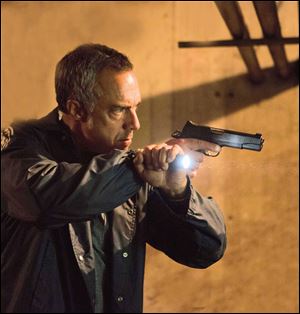
Traces of tragedy remain for actor Titus Welliver
2/11/2015
Titus Welliver in a scene from ‘Bosch.’
BEVERLY HILLS, Calif. — Actor Titus Welliver learned early on that you can’t trust fate. It was a sound lesson for somebody who decided to be an actor after he forsook painting.
The son of famous landscape artist Neil Welliver, Titus began studying with his dad when he was 12. He continued later at art school.
“I became very disillusioned after a year of art school and my father said to me, ‘If it’s not what you love and want to do then don’t do it.’ He said, ‘You’ve always loved the theater and acting why don’t you consider that?’
“So I did. I kind of packed up my stuff in an Army duffle bag, my dad bought me a bus ticket back to New York, and it has been many years — it was not romantic and was hard work — but it sustained me and fulfilled me.”
It sustained him in shows such as Lost, Sons of Anarchy, The Good Wife, Transformers: Age of Extinction. And while he insists he’s not a Method actor, his life armed him for any emotional artillery he needed for the demanding roles.
When he was little, his baby sister died. “Seven months later my stepmother, who I loved dearly, and my younger brother, Eli, was killed in Thailand at the age of 21, and my older brother, Silas, died from a form of muscular dystrophy. He died at 45. When one sustains that kind of loss I think it’s very difficult to trust happiness,” he says in a meeting room of a hotel here.
“So I think in many ways it formed not always the best parts of myself ... I lost my wife a couple years ago who was the mother of my daughter, and I was married before and we had our two sons together,” says Welliver. (His wife, movie producer Elizabeth Alexander, died of cancer in 2012.)
“To regain a sense of footing and trust and have your spouse die is devastating to say the least. That being said, the births of my three children are the most magical and beautiful moments of my life.”
His daughter is 8, his two sons, 12 and 15. “I’m blessed to have such wonderful children and they made me very, very proud and I, in some way, define my success in life by my children,” he says.
“Because I look at them, I’ve had a tough go of it, but they are a source of light and love that is immeasurable.”
Welliver has happily remarried, but the traces of tragedy remain. And they have probably informed his latest role as the tough but tarnished Harry Bosch in Amazon’s Bosch, which begins streaming Friday. Bosch is a Bogartian Los Angeles homicide detective, driven by his principles against his better judgment.
“There’s an aspect of Bosch which is deeply appealing to me,” he says. “He has a tremendous vulnerability. This is a guy who sustained a really traumatic childhood, we get glimpses into that in the pilot. And the readers of the books know his back-story is deeply painful.
“But I think that anybody who has a job that faces the darkest parts of society and sadness can’t go untouched by that. So there’s that great righteousness that Harry has. Being the advocate, he speaks for the victim, and he’s driven by that to seek that justice. But he’s a deeply haunted character. He’s seen too much.”
So has Welliver. The loss of his infant sister shattered his faith, he says. “I thought if there is a God and we are led to believe by religious texts that God is here to protect us, why would you take a life of an infant child? It makes no sense. I’m still a spiritual person. It has challenged certainly every fiber of my spiritual being, but to think that we are just these organisms that are autonomous to the universe and the only ones that are here is kind of ignorant.
“So my sense of God is not a guy with a long white beard and flowing robes. I think that for me, it is my family, that’s where my spirituality comes from — the love I have for my wife, my children, my friends.
“Woody Allen once said, ‘I don’t believe in an after-life, but I’m bringing a change of underwear.’ I think we’ll see.”
Welliver, 53, says he was amazed and inspired at how his children have coped with losing their mother. “Tragedy is tragedy there’s no way to undo it. It’s a rip-off. It’s the price of admission, but it’s antithetical to what we understand. Why should life end? We never mean to be over esoteric, but it’s unfair. We spend lives as human beings loving people we are close to and there is a chapter in which they depart. And it’s completely unfair, but there’s no way around it. You see the train coming, but you can’t anticipate the impact.”